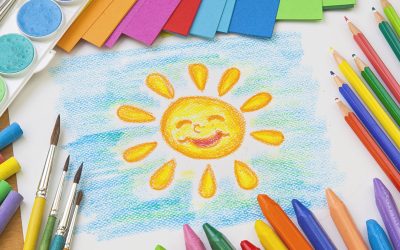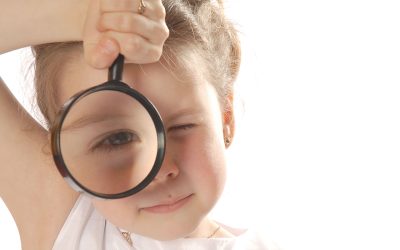Dr. Joanne Foster is returning to our podcast upon the release of her new book, “Ignite Your Ideas: Creativity for Kids,” written for children 12 and older. It provides understandings and strategies, generates exciting, accessible choices and joyful creative experiences for kids and their families. Teachers will also find countless possibilities and strategies. In this podcast, Dr. Foster highlights the role of agency and effort in creativity. She shares a few of the over 100 sure-fire ways to spark creativity across many different areas of interest that are found in her book.
Listen to the podcast here.
[00:00:01.130] – Steve [Intro]
Hello and welcome to the Parents as Learning Coaches edition of the Steve Barkley Ponders Out Loud podcast. Parents and caregivers play many different roles and even sometimes conflicting roles as they support children’s development. The pandemic has shown a light on the importance of parents supporting learners. In this podcast, I’ll share my experiences as a teacher educator, parent, grandparent, and continuous learner that can support your coaching efforts.
[00:00:38.670] – Steve
Ignite Your Ideas. Dr. Joanne Foster is returning to our podcast upon the release of her new book, “Ignite Your Ideas: Creativity For Kids.” She recorded an earlier three part podcast with us that I’d encourage you to review to deepen your understanding of the importance of creativity and the ways to tap the possibilities. I’ve linked those podcasts in the lead-in to this podcast. Her book, “Ignite Your Ideas” was written for children twelve and older. It enlightens and motivates. It provides understandings and strategies, generates exciting, accessible choices, and joyful, creative experiences for kids and their families. Teachers will also find countless possibilities, resources, and strategies. Dr. Foster has written eight books. She has worked in the field of gifted education for over 35 years. She has a master’s degree in special education and adaptive instruction, as well as a doctorate in human development and applied psychology. She writes about intelligence, creativity, child development, motivation, procrastination, and more. Joanne shares her experiences as a parent, educator, consultant, and community advocate. Today, we’ll be talking about igniting creativity. Welcome, Joanne.
[00:02:09.490] – Joanne
Hi. So lovely to be back here. Thank you so much.
[00:02:12.830] – Steve
Thank you for coming back. I’m wondering, for starters, if you’d just review some of the key points that we addressed in that three part series that we did for parents.
[00:02:23.910] – Joanne
Sure. So, in the first podcast episode, I discussed the power of creativity and offer some action steps for enhancing it. In the second episode, I chat about different questions that kids can ask to become more creative, I discuss why people sometimes struggle with creativity and what to do about that and I discuss different outlets for creative expression. And in the third episode, I chatted with you about purposeful action, and practical strategies for cultivating creativity and I also review some of the key takeaways from the previous three episodes. So I invite people to listen to all three, and please get in touch with me as well and let me know your thoughts.
[00:03:11.950] – Steve
The purposeful action piece is a part that I’ve carried forward and have sent people back to in both a couple of podcasts and blogs that I’ve done.
[00:03:25.570] – Joanne
I’ve actually cited you in the book because that was your expression, which I picked up on on that particular podcast episode. I loved it. And so, yeah, you’re in there.
[00:03:36.550] – Steve
So how does ignite your Ideas extend the extensive writing that you’ve previously done around creativity?
[00:03:44.810] – Joanne
Okay, so this is a book for kids and for their families. It’s not a craft book. It’s not a how to guide. It’s a one of a kind burst of glimmers and gleams and flashes of creativity that kids can actually read themselves. I discuss how creativity develops, why it matters, what agency and effort have to do with this, so maybe that’s something we’ll discuss later today, and of course, how kids can ignite the imagination. I have lots of resources, and the last chapter is actually 100 surefire ideas to ignite creativity.
[00:04:20.950] – Steve
There’s a phrase that I know you’ve talked about of brain building as an extension from what people usually talk about as brainstorming. Give us a little more detail around those.
[00:04:37.230] – Joanne
Absolutely. So brainstorming is actually about collaboration and sharing ideas and then developing them. And it can be wonderfully productive. A lot of businesses use brainstorming, school situations, you name it, it’s out there. It’s people getting together, building relationships, and developing new perspectives. And it’s fun too. So that’s brainstorming. Brain building is actually about boosting brain power. So it’s about reinforcing that neuroplasticity – the way the brain functions, developmental pathways inside the brain. And teachers and parents actually would do well to teach children about how their brains function, what kinds of activities are involved in brain boosting. So you might include things like developing new skill sets, preparing for different outcomes in certain situations, of course, exploring and investigating ideas, using your curiosity, and then using your creativity as well. And I think in a lot of schools now, teachers are actually taking the time to discuss how the brain works with children. And once they grasp that, they have such respect for it and it’s wonderful to see things materialize from there.
[00:05:55.350] – Steve
So just a double check for me – I can grow my creativity.
[00:06:01.190] – Joanne
Absolutely. Creativity is something that everybody has the potential to increase. Creativity is a choice. You can either choose to use your creativity or not. It has to do with flexible attitudes towards your daily activities, towards your life decisions. And you can actually boost your creativity by supporting your day to day thoughts and actions, paying close attention to what’s around you, using your senses, discovering the wonder that’s out there, all the possibilities that are out there, culturally – wherever you happen to be, there’s always a possibility to use your imagination and let your mind just go.
[00:06:53.350] – Steve
There’s a chapter in the book that takes a look at agency and effort, and those are words that certainly educators talk a lot about. And I know effort is big on parents’ list. So where do you want to jump in sharing some thoughts and understanding of those two terms?
[00:07:18.910] – Joanne
So why don’t we start with differentiating what the two terms are and what they refer to and then I’ll start with one and then move on to the other and you can jump in in between or at any point in time if you have any thoughts. So in short, agency refers to action and involvement. So a good way to sort of think about that is to consider the quote that Benjamin Franklin once said and it happens to be one of my favorites – “tell me and I forget, teach me and I remember, involve me and I learn.” So that involvement piece is where the agency comes in. Effort on the other hand, is actually hard work. Agency and effort are interconnected and creativity itself comes from taking responsibility for and investing in both agency and effort. So if you want, I can give you some pointers around how to cultivate or support children’s agency and then also a couple of pointers around how to support their effort.
[00:08:26.750] – Steve
Okay, yeah that sounds good, but I want to check with the piece – it’s bringing the two of them together then that has the impact on creativity.
[00:08:35.440] – Joanne
Yeah, I think in a lot of ways there are other things also that have an impact on creativity. But for now, let’s look at these two because they’re very impactful. So let’s start with the agency. So the first thing around agency in terms of involvement and participation is to help kids to become more proactive, to take ownership of possibilities and participation, to think, what do I want to accomplish? How can I do that? What do I have to do first? What technology might be useful? Who can support me in what it is that I’m doing? A teacher, a grandparent parent, a coach, a mentor? I think if kids are going to be proactive, they also have to have faith in themselves. They have to self advocate if they need particular materials or resources or whatever it is. Sometimes we just have to look around and determine what it is that we can actually do to have a more creative outlook around things and to think about our options and our hopes and our dreams and to follow our strengths. So the first aspect there of agency then is to be proactive.








